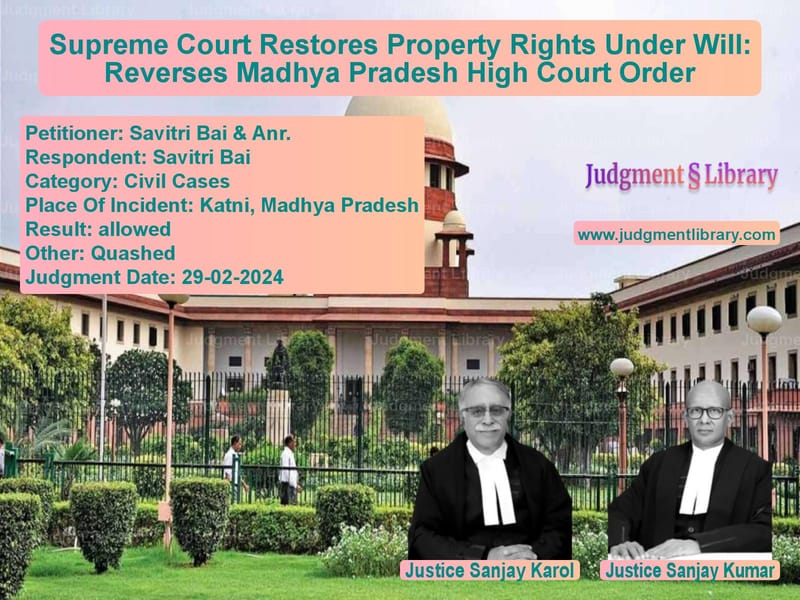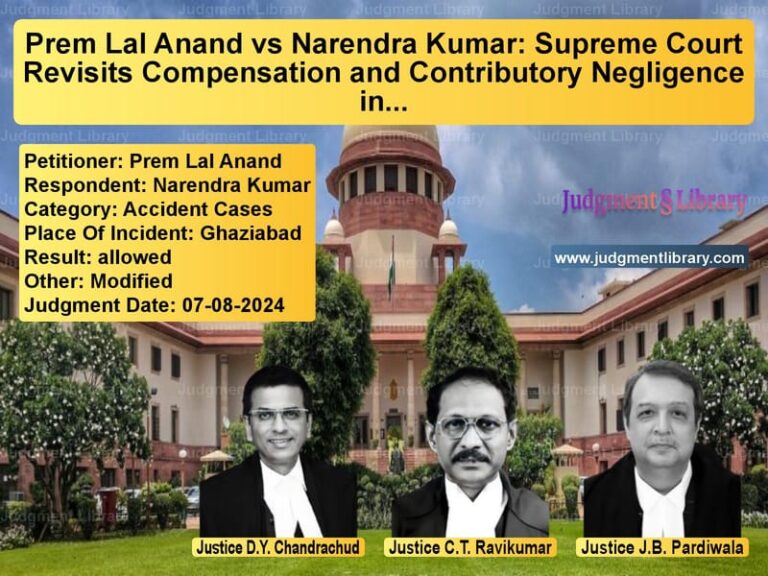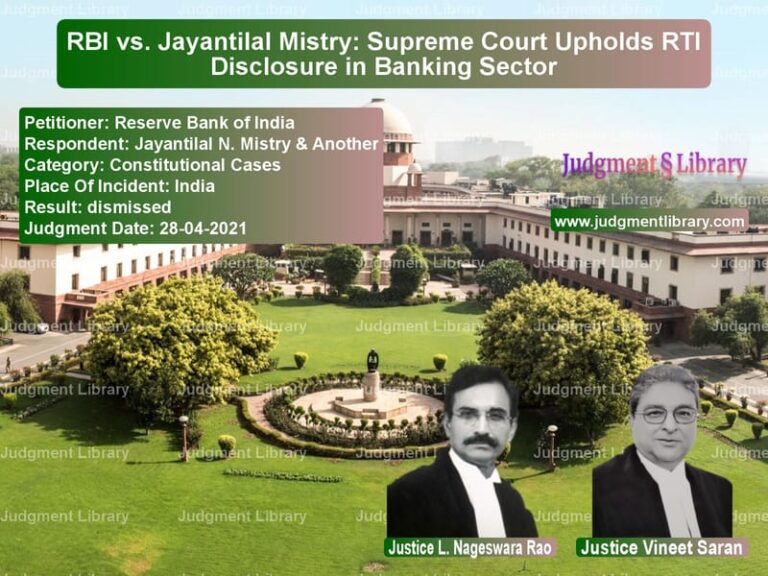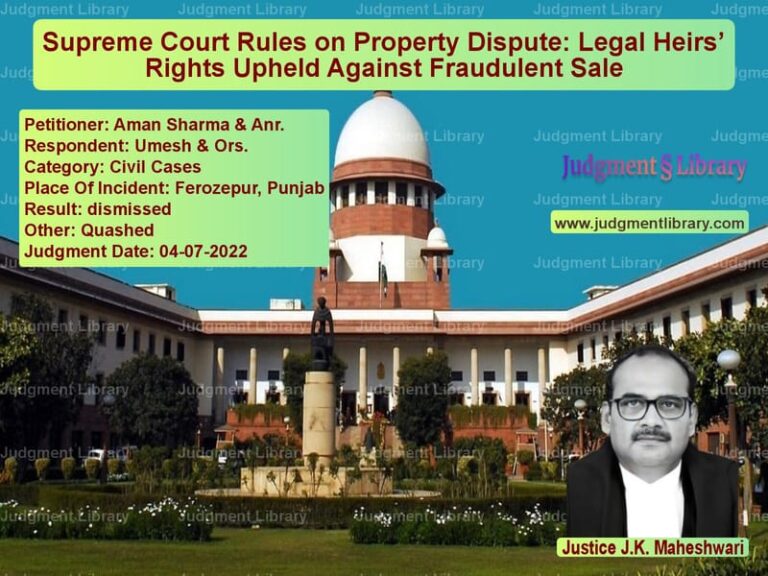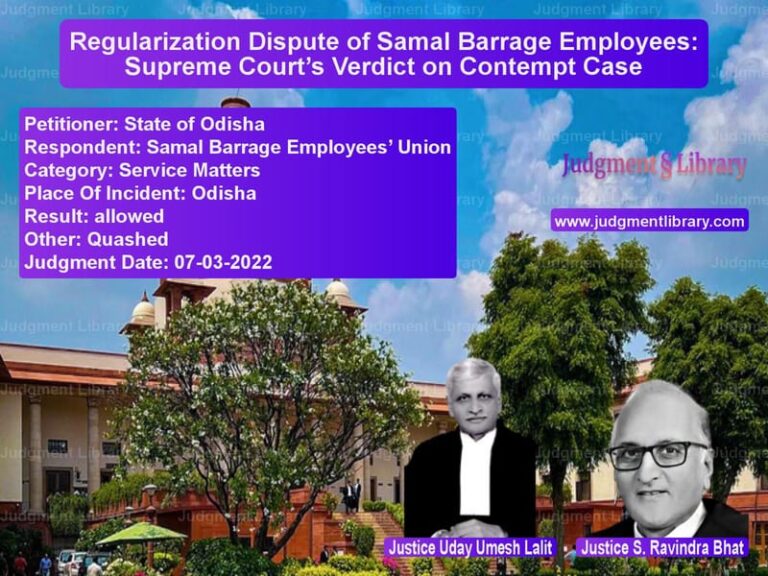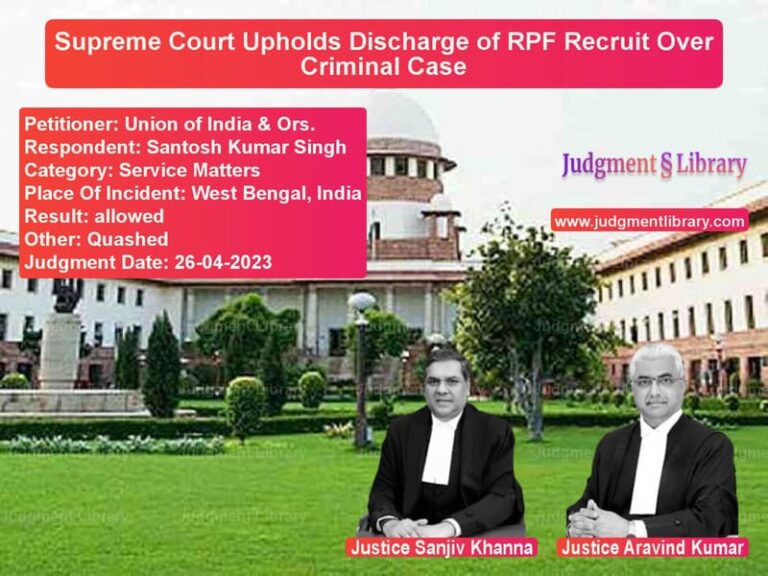Supreme Court Restores Property Rights Under Will: Reverses Madhya Pradesh High Court Order
The Supreme Court, in Savitri Bai & Anr. v. Savitri Bai, set aside a Madhya Pradesh High Court ruling that had declared the plaintiff as the rightful owner of a disputed property. The apex court upheld the validity of a Will in favor of the second defendant, Meghraj, and restored the decisions of the Trial Court and the First Appellate Court. The ruling reinforces the principle that legally executed Wills take precedence over sale deeds executed without the involvement of rightful beneficiaries.
Background of the Case
The case revolves around a disputed property in Katni, Madhya Pradesh, originally owned by Babulal Kahar. Babulal had two wives:
- Savitri Bai (first wife) – Defendant in the case
- Suhadra Bai (second wife) – Along with her children, a party to the sale deed
Babulal had four sons and two daughters with his second wife. Before his death on February 6, 1978, he executed a Will on March 23, 1977, bequeathing the disputed house property to his grandson, Meghraj, son of his first wife.
After Babulal’s death, his second wife and her children sold the disputed property through a registered Sale Deed dated January 18, 1979, to the plaintiff (also named Savitri Bai). The plaintiff claimed that after the execution of the sale deed, she took possession of the property but was allegedly dispossessed by the first defendant (Babulal’s first wife) on January 25, 1979. She then filed a civil suit for possession.
Trial Court and First Appellate Court Findings
The trial court framed several issues, including:
- Whether the plaintiff acquired valid ownership of the property under the sale deed?
- Whether the first defendant unlawfully took possession?
- Whether the Will dated March 23, 1977, executed by Babulal, was valid?
The trial court ruled:
- The plaintiff failed to establish consistent possession after the sale deed.
- The sale deed was executed without the involvement of Meghraj, the legitimate beneficiary under the Will.
- The Will was validly executed and took precedence over the sale deed.
- The plaintiff’s suit was dismissed.
The First Appellate Court upheld these findings, affirming that Meghraj was the rightful owner under the Will.
High Court’s Reversal
However, in Second Appeal No. 395 of 1997, the Madhya Pradesh High Court:
- Declared the plaintiff as the rightful owner.
- Invalidated the Will based on doubts about its authenticity.
- Held that if the Will was genuine, the first defendant would not have signed the sale deed.
- Ordered the restoration of possession to the plaintiff.
Arguments Before the Supreme Court
Petitioner’s (Defendant’s) Arguments:
- The Will was legally executed and attested by independent witnesses.
- The plaintiff’s case was inconsistent – she initially claimed tenancy under Babulal.
- The High Court ignored evidence that proved the Will’s validity.
Respondent’s (Plaintiff’s) Arguments:
- The Will was suspicious and was never produced at the time of sale.
- The first defendant participated in executing the sale deed, proving she did not recognize the Will.
- The sale deed was registered and validly executed.
Supreme Court’s Observations
The Supreme Court, led by Justices Sanjay Karol and Sanjay Kumar, scrutinized the High Court’s reasoning and ruled:
- “The High Court glossed over the legally attested Will without considering the independent evidence provided by the scribe and witnesses.”
- “A validly executed Will cannot be disregarded merely because a family member participated in the sale deed.”
- “The plaintiff’s claim of possession was inconsistent and contradicted by her own testimony.”
Key Legal Findings
- The Will met all legal requirements under the Indian Succession Act, 1925.
- Sale deeds executed without Meghraj’s consent had no legal standing.
- The High Court erred in overturning two lower court judgments without sufficient basis.
Final Judgment
The Supreme Court allowed the appeal and ruled:
“The judgment of the High Court is set aside. The decisions of the Trial Court and the First Appellate Court are restored. The plaintiff has no valid claim over the disputed property.”
Both parties were ordered to bear their own costs.
Key Takeaways from the Judgment
- A legally executed Will prevails over subsequent sale deeds.
- Courts must consider the validity of Wills based on independent witness testimony.
- Possession claims must be supported by consistent and clear evidence.
- The High Court must not overturn lower court findings without substantial justification.
Impact of the Judgment
This ruling reinforces key principles in property law:
- Provides clarity on the precedence of Wills over conflicting sale transactions.
- Prevents unauthorized property dispossession through dubious sale deeds.
- Strengthens legal protections for beneficiaries named in a Will.
- Ensures that courts uphold legally executed documents instead of speculative findings.
Conclusion
The Supreme Court’s decision in Savitri Bai & Anr. v. Savitri Bai upholds the sanctity of legally executed Wills. By reversing the High Court’s erroneous ruling, the Court has ensured that rightful beneficiaries under a Will cannot be displaced through disputed sale transactions. This case serves as an important precedent in property disputes, particularly in cases involving contested Wills and conflicting sale deeds.
Read also: https://judgmentlibrary.com/supreme-court-resolves-dispute-over-temple-owned-shops-in-tamil-nadu/
Petitioner Name: Savitri Bai & Anr..Respondent Name: Savitri Bai.Judgment By: Justice Sanjay Karol, Justice Sanjay Kumar.Place Of Incident: Katni, Madhya Pradesh.Judgment Date: 29-02-2024.
Don’t miss out on the full details! Download the complete judgment in PDF format below and gain valuable insights instantly!
Download Judgment: savitri-bai-&-anr.-vs-savitri-bai-supreme-court-of-india-judgment-dated-29-02-2024.pdf
Directly Download Judgment: Directly download this Judgment
See all petitions in Property Disputes
See all petitions in Succession and Wills
See all petitions in Judgment by Sanjay Karol
See all petitions in Judgment by Sanjay Kumar
See all petitions in allowed
See all petitions in Quashed
See all petitions in supreme court of India judgments February 2024
See all petitions in 2024 judgments
See all posts in Civil Cases Category
See all allowed petitions in Civil Cases Category
See all Dismissed petitions in Civil Cases Category
See all partially allowed petitions in Civil Cases Category

